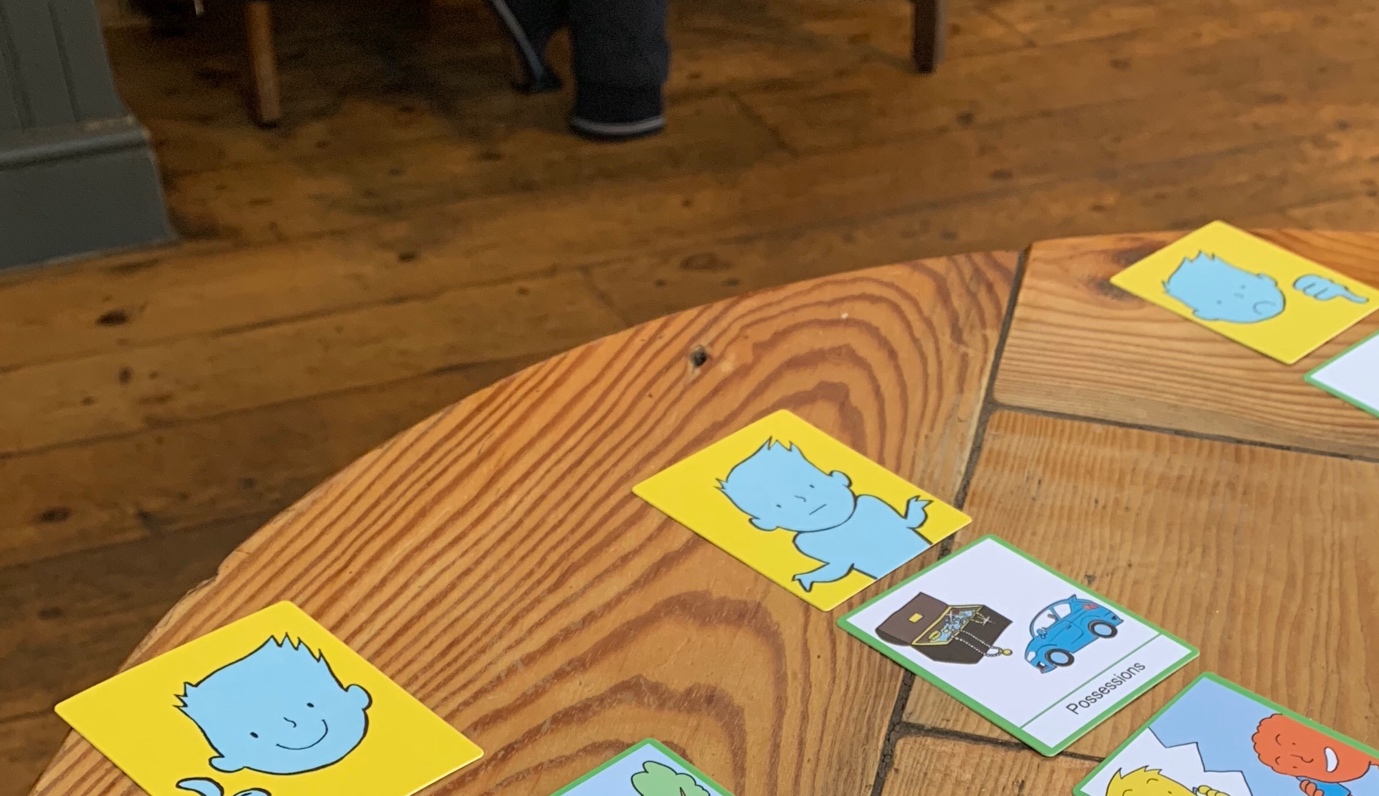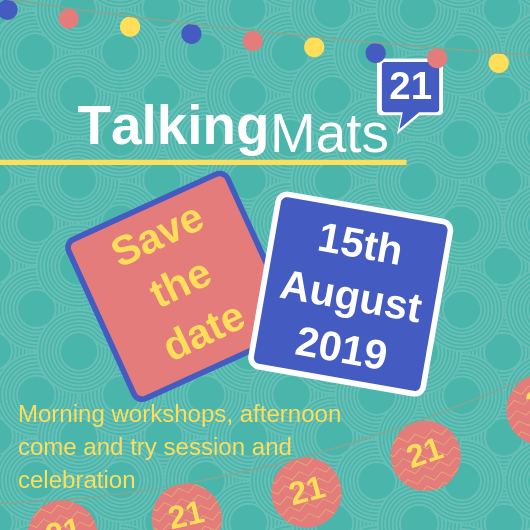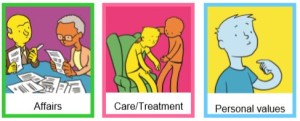Many thanks to Dr Sally Boa, Head of Education, Research and Practice Development at Strathcarron Hospice in Stirlingshire, for this latest guest blog – linking to her great presentation at our TM is 21 event in August. Sally’s presentation – Talking Mats and Palliative care – focused on using Talking Mats in Palliative and End of Life Care, and included information about the Talking Mats ‘Thinking Ahead’ resource – here Sally shares her own experiences:
Talking about death and dying and making plans for the future is difficult to do. This is partly because no one likes to think about their own mortality and partly because as a society we don’t talk about it. I work in a hospice where people are encouraged to talk about the care and treatment they would want as their condition deteriorates. Even here, these conversations can be difficult, particularly if someone has communication or cognitive difficulties, if there is uncertainty about prognosis or if there are different opinions within the family. The ‘Thinking ahead’ Talking Mats resource is a great tool to use to enable these conversations to happen. In my presentation at the ‘Talking Mats is 21’ event, I provide some background about how the resource was developed. I have used it to support those with communication difficulties to have a voice and also with people who simply find this a difficult topic to think and talk about. Use of the Mats helps people to think through the issues one at a time and see for themselves how they feel about things in relation to one another. Most importantly, it helps open up the conversation about the future and helps people to prioritise and see for themselves what they need to do in relation to making plans for the future. Then they can get on with living and doing the things that are most important to them.
A most memorable example of using Talking Mats with someone towards the end of life is when I was asked to work with ‘Gill’ who had severe communication difficulties. I used the ‘Thinking ahead’ resource with her and found out that she had made many plans in relation to sorting out her affairs (e.g. power of attorney, funeral arrangements). She hesitated when I showed her the ‘making memories’ symbol and at the time I couldn’t work out why. To finish the session, I used the ‘indoor interests’ symbols with Gill and we had a great conversation about all the things she enjoyed doing. When I gave Gill the ‘arts and crafts’ symbol, she became really animated, and was able to tell me that she wanted to finish creating a memory book of photos that she had been making up for her family. Using the Mats, Gill managed to convey why she had hesitated with the ‘making memories’ symbol. Following on from this, we had a conversation with the hospice creative arts coordinator who was able to support Gill to complete, not only her memory book, but also other creative pieces. In her last few days of life, Gill was able to identify and work towards really important goals and left some amazing memories for her family.
To find out more about our Thinking Ahead resource, which is available to those who have accessed our Foundation Training – follow this link – https://www.talkingmats.com/product/thinking-ahead/
If you haven’t accessed our Foundation Training yet – find out more here https://www.talkingmats.com/training/foundation-training/
Rachel Woolcomb, our Talking Mats OT Associate, shares a recent personal experience where she used Talking Mats to support a difficult conversation:
The vision of Talking Mats is to improve the lives of people with communications difficulties. I have been reflecting recently on the definition of ‘communication difficulties.’
When I first heard about, and started to use Talking Mats 10 years ago, my perception was that it was fantastic for those that could not speak but I must admit I didn’t really consider using it with people who, such as myself, could use their voice to communicate.
Over the years as my understanding has developed, and I have looked further into the use of Talking Mats as a ‘thinking tool’ I have come to a different conclusion.
I would like to suggest that at some points in our lives, each one of us is likely to experience a communication difficulty. I don’t mean that we cannot physically speak, but that we cannot express what we really want to say in words. Perhaps a topic is too difficult to talk about with someone so we don’t bother, or we are overwhelmed by the subject that we don’t really know where to start.
One such subject is that of death and dying.
We know it will happen to us all one day but to talk openly with loved ones, is for some reason, too much to comprehend, too emotive, or considered bleak.
I am very fortunate enough to have grandparents in their 90’s however the conversation about their wishes for the future goes unspoken. It is a challenge for my parents to raise the issue therefore it remains the big unknown.
This is a common problem. In 2009, The National Council for Palliative Care wanted to address this issue and set up the Dying Matters Coalition in England and Wales, to help people talk more openly about dying, death and bereavement and to make plans for the end of life.
Talking Mats have produced a set of topic cards called ‘Thinking Ahead.’ https://www.talkingmats.com/product/thinking-ahead/
These were created in consultation with Strathcarron hospice to help people with advanced illness or long term conditions to think ahead and plan for the future. The three topics in the set are: Affairs, Care and Treatment and Personal Values.
My Mum was interested in my role with Talking Mats and wanted to understand what it was all about. We had already started to talk about the challenges of having difficult conversations, especially about death, and therefore over a drink, in a relaxed coffee shop, we embarked on a journey of discovery using a Talking Mat. My Mum as the Thinker and myself as the Listener .
She used the Talking Mat to help her think about things she had not considered and was able to make plans about what she wanted to do next. I heard her wishes and her thoughts, on why certain things were important to her. It was a very special time, facilitated by a Talking Mat.
My challenge to you as readers of this blog is to ask yourself ‘what do I have difficulty talking about’ – A Talking Mat just might be the answer!
Another resource you might find helpful is ‘Let’s Talk about Death and Dying’ – www.ageuk.org.uk
Rachel will be running a ‘Talking Mats as a Thinking Tool’ workshop at our Talking Mats is 21 Event is in Stirling on Thursday 15th August 2019. Dr Sally Boa from Strathcarron Hospice will also be running a ‘Talking Mats in End of Life Care’ workshop at this event. Thanks to funding from NHS Forth Valley endowment committee the event is free but you do need to book your space https://www.eventbrite.co.uk/e/talking-mats-is-21-tickets-62362171935
You can come to the morning only, afternoon only or come for the whole day.
If you can’t come to our event watch out for out blogs and social media celebrating the reach of Talking Mats for 21 days before the 15th of August. Please join in with your contributions using the hashtag #TMis21. For 21 days after our event we will be having a special Birthday offer! Watch this space, more to follow …….
Rachel Woolcomb, our Talking Mats OT Associate, tells us about the recent Royal College of Occupational Therapists’ Report and considers the ways Talking Mats can support:
The Royal College of Occupational Therapists have recently published a new report. “Making personalised care a reality: The role of occupational therapy.”
As the OT Associate for Talking Mats, I took the opportunity to review the document and consider how Talking Mats can help OT’s in fulfilling the recommendations made.
The report recognises that people living with long-term conditions bring different and equally important, knowledge and expertise to the decision –making process.
It challenges OT’s to ensure that they really listen to, and hear the views of the people they work with.
A Talking Mat can help facilitate this. It helps people to understand what is being discussed, to reflect and organise their thoughts, to say what matters most to them and record their views. It helps OT’s to really listen, to learn new information, to involve the person in their own planning and support decision making.
Read more about how Talking Mats can help OT’s to make personalised care a reality in the TMOT Resource 1: TM Personalised Care – Copy.
The RCOT report is available here: https://www.rcot.co.uk/news/delivering-personalised-care-frontline
Rachel would love to hear from you if you have any examples of how Talking Mats have helped you to provide personalised care, or if you want to know more about OT and Talking Mats. Her email is: Rachel@talkingmats.com.
If you are feeling inspired and would like to find out about accessing Talking Mats Foundation Training, take a look at our upcoming courses across the UK, as well as online and organisational training options: https://www.talkingmats.com/training/
Many thanks to Mary Walsh, Health Service Executive (HSE) Senior SLT at St Mary’s Hospital, Dublin for this fantastic blog post about their project involving use of Talking Mats to support people with Dementia to participate in decision making related to their needs:
In September 2016 Aideen Lawlor (SLT Manager) and I (Senior SLT) won the Dementia Elevator award with a project entitled “Empowering Persons with Dementia to become more Active Participants in Decision Making Related to Their Present and Future Needs.” with Talking Mats being an integral part of this project. In November 2017, the prize money was used to fund my training to become an accredited Talking Mats trainer so that I could then train others in TM Foundation Course on a prioritised basis.
This project is now complete with 6 speech and language therapists (SLTs) from a variety of settings working with persons with dementia all trained in using Talking Mats. As part of their training, The SLTs used TM with patients/ residents with particular reference to the Assisted Decision Making (Capacity) Act 2015. TMs were also used to help the clinicians to get to know their patients, in care planning, in improving increased opportunities for interaction and in improving choices and decision making. In effect, we were checking it out!
All the SLTs found that when TM principles are followed, that it helped to empower people with dementia to make decisions about their care. Some of the reported findings:
- That the pictures help maintain attention and aid comprehension.
- That it facilitated strengths rather than a deficit model.
- That photographed completed TM provided a pictorial record for meetings – very positive.
- That it provided a significant catalyst for change in some instances.
- That it helped people with dementia and responsive behaviour get needs met
- That video recording sessions with consent greatly enhances reflective practice and may be helpful in key decision making
The next phase is to expand the number of SLTs who can provide training in Talking Mats across the Republic of Ireland. Funding from the national SLT professional body training grant scheme has been sought for these 6 SLTs to become trainers for Talking Mats. This will result in cascading training on a priority basis, increase evidence base/ knowledge re using TM and embedding TM in variety of clinical settings with SLTs leading this practice.
Mary Walsh,
Senior speech and language therapist,
St. Mary’s Hospital,
Phoenix Park, Dublin 20,
Ireland
Aideen Lawlor
Speech and Language Therapy Manager
If you are feeling inspired and are interested in accessing Talking Mats training, we offer Foundation Training courses throughout the UK and Ireland as well as online – take a look here for more details:
Once you have accessed Foundation Training you can apply for our Accredited Trainers course to enable you to deliver Talking Mats training to others in your area.
This new resource has been developed by Strathcarron Hospice and Talking Mats to help people with advanced illness or long term conditions to think ahead and plan for the future.
It consists of a booklet and 3 topic symbol sets: Affairs; Care/treatment; Personal values
It can be used to help people have conversations about:
• the extent to which their personal affairs are sorted;
• what they would or would not consider about future treatments and care;
• what is going well/not going well in relation to their personal values
It is widely recognised that having discussions about end of life issues can enable people to remain in control for longer and help them to identify the care and support they need and want as they approach death. In spite of this, in Scotland:
- 74% of people have not discussed what their wishes would be if they did not have long to live
- 79% of people don’t have any written plans for their end of life care, financial wishes or funeral plans
- Only 35% of people have written a Will
It can sometimes be difficult for people to start conversations about planning for end of life and people this is exacerbated if people have specific difficulties communicating their thoughts and feelings because of symptoms, fatigue and emotional factors. Before initiating this type of conversation it can be helpful to check the extent of a person’s understanding of their illness and whether or not they want to talk about the future.
The importance of having conversations and making plans for end of life has been highlighted as being relevant for people in the early stages of life limiting illness as well as for those nearing the end of life. There is evidence that people who have Advance or Anticipatory Care Plans in place are more likely to receive the care that they want and treatment can be less invasive. ACP is a process rather than a one-off conversation. It is acknowledged that ACP discussions should take place in appropriate settings with sufficient time to enable to people to consider and weigh up different options. ACP should also be developed in line with peoples’ personal values and goals (Sinuff Tasnim, et al.(2015) “Improving end-of-life communication and decision making: the development of a conceptual framework and quality indicators.” Journal of pain and symptom management 49.6 2015): 1070-1080).
Perhaps we should think about planning ahead whether or not we have advanced illness or long term conditions??
Training
To get the most out of the resource we run half day advanced training courses which will include the Thinking Ahead Resource. This course will be relevant to you if you:
- have attended a Talking Mats foundation training and are experienced in using Talking Mats with adults
- want to extend your use of Talking Mats and consider its role and application to advance care planning
- want to discuss sensitive topics around end of life care
Please contact us at 01786 479511 if you are interested in future dates.
We are currently working to develop a Talking Mats resource to support conversations relating to Advance Care Planning (ACP) with staff and patients from Strathcarron Hospice. People who use hospices often have specific difficulties communicating their thoughts and feelings because of advanced illness and emotional factors.
Sixteen staff from the multidisciplinary team at Strathcarron Hospice were trained to use Talking Mats by Sally Boa who is Head of Education, Research and Practice Development at Strathcarron Hospice and also one of our accredited trainers.The staff trained used it successfully with patients in the hospice and found that they could use it with a range of patients for a variety of purposes: getting to know someone; identifying goals; discharge planning.
A sub-group of staff attended a workshop with members of the Talking Mats team to discuss the potential use of Talking Mats to support conversations relating to ACP. Topics and options were agreed. These were then presented to a wider forum of staff from Highland Hospice for validation and checking. Three main topics to support ACP conversations were identified: Affairs; Care and Personal Values. New symbols are being developed and the resource will be trialled with a range of patients in the hospice setting.
Our hope is that Talking Mats can be used by trained staff in a hospice setting to support people to express their views and help them plan for the end of life and that it will also be helpful for many other people to consider future options in their lives.
We will write an update once the new resource has been completed.
 Online training login
Online training login 








